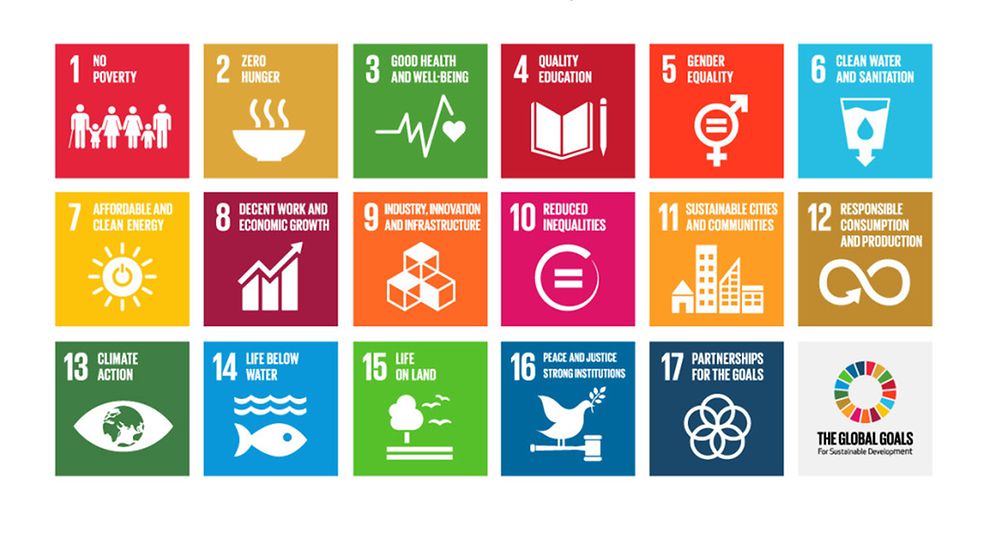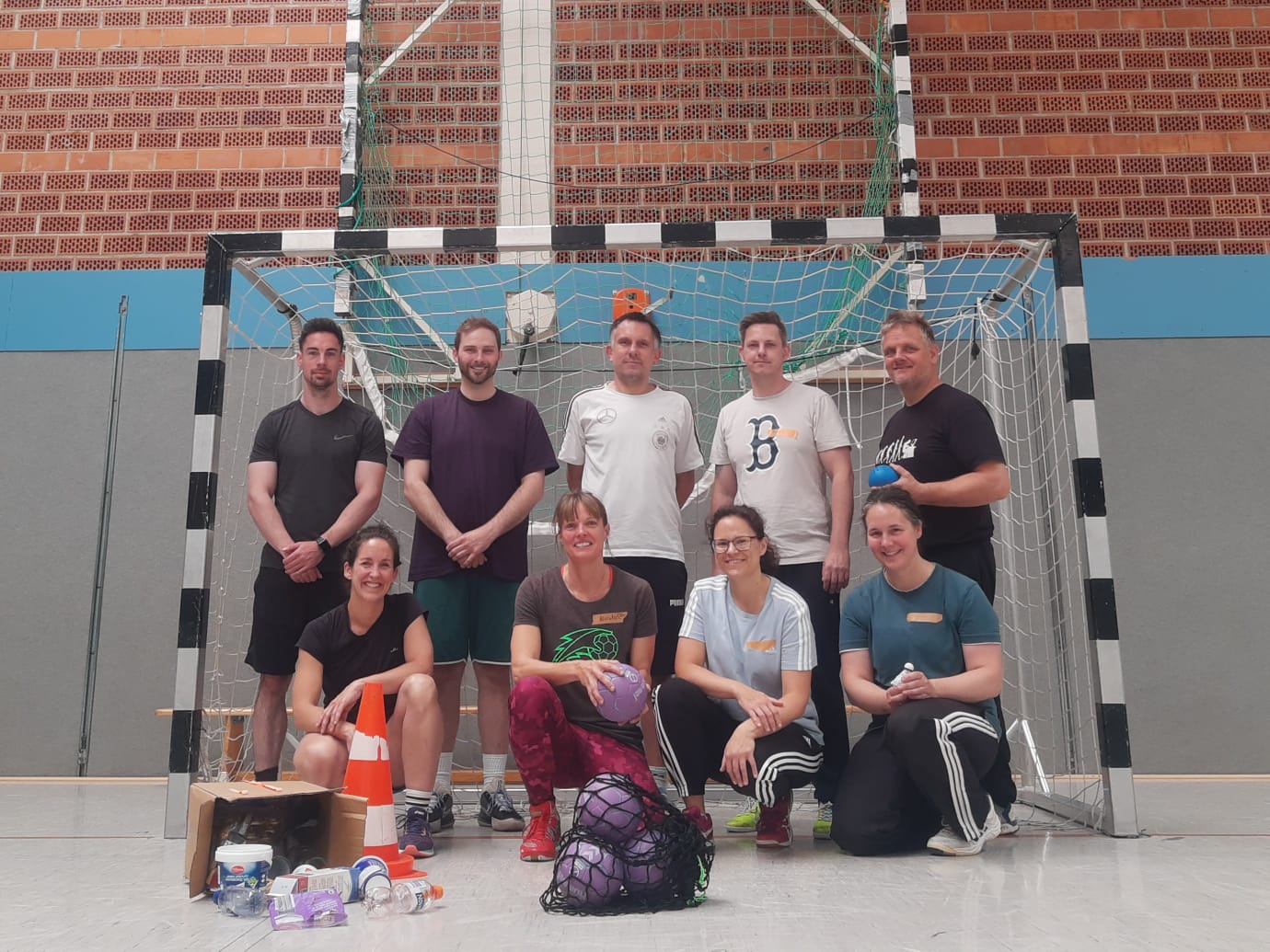Nicola (founder of PLAY HANDBALL) reports on how sport is linked to education and sustainable development and on current seminars and training courses for students, teachers and volunteers on the topic of sport as an educational tool for sustainable development. Nicola reports: ‘This spring, I once again had the opportunity not only to lecture at Leuphana University in Lüneburg (Germany) as a guest lecturer on the topic of “Sport as an educational tool for sustainable development (ESD)”, but also to give training courses for teachers in the Oldenburg area, sponsored by the OLB Foundation. Over 30 students from Leuphana University Lüneburg took part in the seminar in cooperation with Dr Jessica Süßenbach. This is the second year that we have offered this course, which is open to students from all subjects as part of the complementary study programme, and we will be holding it again next summer semester.
The aim of the courses on ESD is to qualify multipliers – especially in the school education sector – to enable them to use playful, methodical approaches to sensitise children and young people to environmental protection and sustainable behaviour. The collection of games ‘Umwelt bewegen – Spiele fair für die Umwelt’ (Scholl and Frowin, Hofmann-Verlag 2022), which emerged from the PLAY HANDBALL Supercup project, serves as the basis for the seminars.
But what exactly is education for sustainable development, short ESD, and how is ESD linked to sport?
Education for Sustainable Development (ESD) is a sub-goal (SDG 4.7) of Sustainable Development Goal 4 ‘Quality Education’ of the 17 global Sustainable Development Goals of the 2030 Agenda. ‘The Agenda is a roadmap for the future that will enable people around the world to live in dignity while preserving the natural foundations of life in the long term.’ This includes topics such as the responsible use of natural and finite resources, treating our fellow human beings with respect and understanding and living together in peace, as well as promoting economic development through innovation. The 2030 Agenda comprises a total of 17 goals with 169 sub-goals, from Goal 1 ‘No poverty’ to Goal 10 ‘Reduced inequalities’ and Goal 17 ‘Partnerships for the goals’. These goals concern EVERYONE, it says: governments worldwide, the private sector, science and also civil society. (compare Bundesregierung, BNE-Portal, globalgoals.org, Links below)
GOAL 4.7 EDUCATION FOR SUSTAINABLE DEVELOPMENT AND GLOBAL CITIZENSHIP – By 2030, ensure that all learners acquire the knowledge and skills needed to promote sustainable development, including, among others, through education for sustainable development and sustainable lifestyles, human rights, gender equality, promotion of a culture of peace and non-violence, global citizenship and appreciation of cultural diversity and of culture’s contribution to sustainable development. (www.globalgoals.org)
The goals often seem far-fetched to the ‘normal’ citizen: What is an individual supposed to contribute to making the world a place of peace, without hunger and poverty, with equal educational and professional opportunities for all, and not just in the global North, but also in the global South? The topic of education for sustainable development is not only relevant in educational institutions such as schools and universities; sports clubs and other areas of our society can and must also make a contribution to ensuring that ‘everyone has the skills and abilities to help shape a sustainable society.’ The 2030 Agenda calls on schools and other educational institutions to integrate the topic of education for sustainable development into the teaching context. ‘The aim is to empower and strengthen learners in a globalised and constantly changing world so that they can make mature, self-determined and responsible decisions,’ according to the Lower Saxony education portal. Often, however, not all pupils are interested in such socially relevant topics; they lack a personal connection. Why do I need to protect the forest? A child who has the forest as a place to play understands this better than a child who grows up in the city among grey asphalt. In the field of experiential education or outdoor sports, direct encounters and experiences in nature are created. But in everyday school life, with strict curricula and little time, or even asphalted schoolyards, an excursion into nature tends to be the exception.
In the training courses and seminars on sport as an educational tool for sustainable development, the main focus lies on how to establish a connection in order to raise awareness of environmental protection and sustainable behaviour, to create interest, to inspire and ultimately to initiate educational processes in terms of sustainability. In order to make an active contribution to a sustainable society and to be able to take these sustainable decisions, skills and knowledge must be imparted, but motivation and willingness must also be awakened. This educational process can be supported and facilitated through a playful approach. Children and young people have a natural urge to play and be active. Sport and play are generally associated with fun and enjoyment. Topics such as recycling and waste separation, air pollution or energy-saving behaviour, on the other hand, tend to be perceived as unpleasant and are associated with effort. Sports games and exercise are used as a tool to create a direct link to environmental sustainability through play. The ‘Umwelt bewegen’ (English Title: Play Fair for the environment) game collection provides an approach that incorporates a specific environmental learning objective directly into the course of the game. In this way, it is not only explained, but also experienced in a playful way and made understandable why, for example, trees or plankton in the ocean are important for clean air, or why clean water is essential for the survival of us, animals and plants. In the game, the ball becomes the oxygen that keeps you alive, a ‘clean’ pass is not only good for scoring points, but also symbolises careful handling of waste and good defensive behaviour can protect the trees, which not only protect the soil from erosion, but are also important suppliers of oxygen through photosynthesis and thus contribute to clean air.
“Ein inspirierender, aktiver Workshop, bei welchem schon direkt neue Spiel- und Bewegungsideen entstehen. Die erlernten Inhalte und die Spielideen aus dem Buch können sofort im eigenen Unterricht Verwendung finden.” (Marlene Wyllie, Oberschule Bad Zwischenahn)
PLAY HANDBALL’s vision is not only to promote handball for disadvantaged children and young people, to contribute to intercultural understanding through sport, for example through exchange programmes, but also to use sport to draw attention to important socio-political issues such as environmental protection, gender equality or health and well-being. In order to bring about positive social change, our aim is to strengthen interest, enthusiasm and knowledge for sustainable topics and behaviours. Sport is an excellent and unique tool for this, as it is inspiring and popular, connects people, provides a playful way to experience social interaction, teaches social skills and also raises awareness. With the game series, with workshops on this topic, but also through our Supercup tournaments, we want to contribute to a world in which everyone treats themselves, their fellow human beings and the environment respectfully, fairly and responsibly.
Supercup PLAY HANDBALL’s Environmental Education Tournament.
„Umwelt bewegen – Spiele Fair für die Umwelt“ (Scholl und Frowin, 2022), ISBN 978-3-7780-8200-3; English Title “Play Fair for the Environment” order via info@Play-Handball.org
Seminars in Germany on Sport as an Instrument for ESD:
- 2023: Seminar at Deutschen Sporthochschule (DSHS) (supported by Engagement Global NRW)
- 2023: Seminar at Leuphana Universität Lüneburg, SoSe 2023
- 2023: Online-Workshop for Faciliators of Deutschen Jugendherbergen (DJH) Bayern and Baden-Württemberg
- 04 Jun 2024: Teachers Training, Oberschule Bad Zwischenahn (supported by OLB-Stiftung)
- 05 Jun 2024: Teachers Training, Haupt- und Realschule Altes Amt Friedeburg (supported by OLB-Stiftung)
- 28 Jun 2024: Training for UEFA Euro 24 Volonteers in Düsseldorf (on request of Engagement Global NRW)
Further Links:
- The 17 Global Sustainable Development Goals explained (Deutsch): Bundesregierung.de Nachhaltigkeitspolitik
- The 17 Global Sustainable Development Goals explained (Englisch): www.globalgoals.org
- BNE-Portal: BNE-Portal.de


